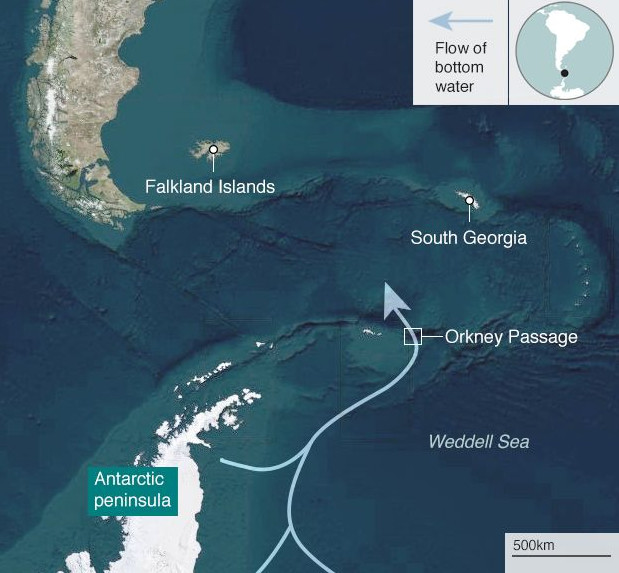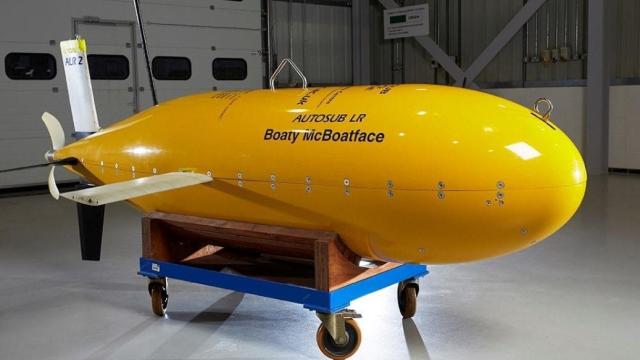Later this week, an Antarctic expedition will set off to map the undersea currents that play a critical role in regulating our planet’s climate. To assist them, the scientists will use an autonomous submarine that was famously named Boaty McBoatface by the collective genius of the internet.
Image: NOC
[referenced url=”https://gizmodo.com.au/2016/04/boaty-mcboatface-won-the-poll-to-name-a-300-million-research-ship/” thumb=”https://i.kinja-img.com/gawker-media/image/upload/t_ku-large/nnma9bpd4hpj1kjfk0zo.png” title=”Boaty McBoatface Won The Poll To Name That $US400 ($530) Million Research Ship” excerpt=”In case you needed more evidence that the internet, left unfettered, is amazing. Boaty McBoatface has now topped the poll to name an upcoming polar research vessel.”]
The project, called the DynOPO (Dynamics of the Orkney Passage Outflow) expedition, is a joint effort between the British Antarctic Survey (BAS) and Southampton University. By mapping the flow of Antarctic Bottom Water (AABW) within the 3500m-deep Orkney Passage, the researchers are hoping to understand how these important deep sea currents are being affected by climate change.
To assist them, the researchers will be equipped with Boaty McBoatface, the first of three long-range autonomous submarines that are being developed by the National Oceanography Center (NOC). The moniker comes from last year’s campaign by the Natural Environment Research Council to name the UK’s new polar research ship. In a now-infamous event, the public voted for Boaty McBoatface, but the humourless British government deemed it unsuitable, choosing the much more boring name of Sir David Attenborough instead.
As consolation, and to keep the name alive, a submarine was dubbed Boaty instead.
[referenced url=”https://gizmodo.com.au/2016/05/boaty-mcboatface-will-actually-be-called-rrs-sir-david-attenborough/” thumb=”https://i.kinja-img.com/gawker-media/image/upload/t_ku-large/s8dfliohfpisg0ra8lw8.png” title=”No ‘Boaty McBoatface’ Ship, But Submersible Gets The Name Instead” excerpt=”Democracy is a sham, if you’re naming a boat at least. Despite Boaty McBoatface winning a public vote as the name for a new polar research ship, the vessel will in fact be known as RRS Sir David Attenborough.”]
Along with Boaty, the scientists will depart Punta Arenas in Chile on March 17 aboard the BAS research ship RRS James Clark Ross. They will head to an area of the Southern Ocean about 800km from the Antarctic Peninsula, from which they will deploy an array of instruments, including some that will be moored to the seafloor. These tools, along with the sub, will measure ocean turbulence at great depths.
Boaty will travel back and forth along an abyssal current of AABW through the so-called Orkney Passage. It will measure the intensity of the flow, which acts as a kind of undersea conveyor belt, bringing cold water to the Earth’s equatorial regions, and contributing to global circulation. At the Orkney Passage, this deepsea flow goes through a “chokepoint” as it heads from Antarctica’s Weddell Sea to the Atlantic Ocean.

Image: BAS
Recently, scientists have suspected that changing winds over the Southern Ocean are affecting the speed of seafloor currents carrying AABW — and that could be affecting the amount of turbulent flow in the Orkney Passage.
“We know that a major driver of the abyssal ocean warming, at least in the Atlantic Ocean, is changes in winds over the Southern Ocean,” noted lead scientist Alberto Naveira Garabato from the University of Southampton in a statement. “The abyssal waters of the World Ocean sink in the Southern Ocean, and flow northward along the seafloor in submarine streams. When these streams encounter submarine topography or key chokepoints, they navigate it by squeezing through valleys and around mountains, occasionally forming submarine waterfalls — much as a river flowing toward the sea does on the Earth’s surface.”
Today, scientists suspect that more heat is getting mixed into AABW from shallower, warmer ocean layers. This warmer water is getting delivered to the equator, and it could be affecting the planet’s climate. The Orkney Passage is likely a key chokepoint in this process, which is why the researchers are hoping to learn more about the speed of its streams, the degree of turbulence down below, and how deep sea waters are responding to changes in the winds over the Southern Ocean. Ultimately, the researchers would like to create models to help them predict how our climate will change during the 21st century and beyond.
“One of the most surprising features of the climate change that we are currently experiencing is that the abyssal waters of the world ocean have been warming steadily over the last few decades,” said Garabato. “Establishing the causes of this warming is important because the warming plays an important role in moderating the ongoing — and likely future — increases in atmospheric temperature and sea level around the globe.”
Boaty McBoatface may have a silly name, but its mission is far from trivial. If nothing else, its name will likely draw extra attention to the project, and educate the public about the ongoing effects of climate change.
